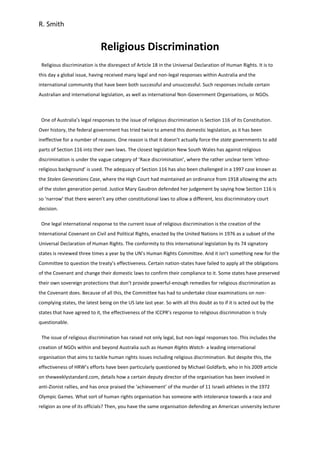Effectiveness of Legal & Non-Legal Responses to Religious Discrimination
- 1. R. Smith Religious Discrimination Religious discrimination is the disrespect of Article 18 in the Universal Declaration of Human Rights. It is to this day a global issue, having received many legal and non-legal responses within Australia and the international community that have been both successful and unsuccessful. Such responses include certain Australian and international legislation, as well as international Non-Government Organisations, or NGOs. One of AustraliaˇŻs legal responses to the issue of religious discrimination is Section 116 of its Constitution. Over history, the federal government has tried twice to amend this domestic legislation, as it has been ineffective for a number of reasons. One reason is that it doesnˇŻt actually force the state governments to add parts of Section 116 into their own laws. The closest legislation New South Wales has against religious discrimination is under the vague category of ˇ®Race discriminationˇŻ, where the rather unclear term ˇ®ethno- religious backgroundˇŻ is used. The adequacy of Section 116 has also been challenged in a 1997 case known as the Stolen Generations Case, where the High Court had maintained an ordinance from 1918 allowing the acts of the stolen generation period. Justice Mary Gaudron defended her judgement by saying how Section 116 is so ˇ®narrowˇŻ that there werenˇŻt any other constitutional laws to allow a different, less discriminatory court decision. One legal international response to the current issue of religious discrimination is the creation of the International Covenant on Civil and Political Rights, enacted by the United Nations in 1976 as a subset of the Universal Declaration of Human Rights. The conformity to this international legislation by its 74 signatory states is reviewed three times a year by the UNˇŻs Human Rights Committee. And it isnˇŻt something new for the Committee to question the treatyˇŻs effectiveness. Certain nation-states have failed to apply all the obligations of the Covenant and change their domestic laws to confirm their compliance to it. Some states have preserved their own sovereign protections that donˇŻt provide powerful-enough remedies for religious discrimination as the Covenant does. Because of all this, the Committee has had to undertake close examinations on non- complying states, the latest being on the US late last year. So with all this doubt as to if it is acted out by the states that have agreed to it, the effectiveness of the ICCPRˇŻs response to religious discrimination is truly questionable. The issue of religious discrimination has raised not only legal, but non-legal responses too. This includes the creation of NGOs within and beyond Australia such as Human Rights Watch- a leading international organisation that aims to tackle human rights issues including religious discrimination. But despite this, the effectiveness of HRWˇŻs efforts have been particularly questioned by Michael Goldfarb, who in his 2009 article on theweeklystandard.com, details how a certain deputy director of the organisation has been involved in anti-Zionist rallies, and has once praised the ˇ®achievementˇŻ of the murder of 11 Israeli athletes in the 1972 Olympic Games. What sort of human rights organisation has someone with intolerance towards a race and religion as one of its officials? Then, you have the same organisation defending an American university lecturer
- 2. R. Smith ¨C who is wanted overseas for acts of war crimes and genocide that he was eventually arrested for. And this is all because HRW forgot to investigate the convicted professorˇŻs case. So as this for evidence, it can be evaluated that the corrupt bias of the staff of Human Rights Watch shows how NGOs can be an unreliable and thus ineffective response to the current issue of religious discrimination. As you can see, religious discrimination is a human rights issue present in a global scale. It has been responded to legally and non-legally within Australia and the international community in such ways as the enactment of domestic and international law and the formation of numerous non-government organisations. These responses have shown that the contemporary issue of religious discrimination has been acted upon with differing levels of effectiveness.


